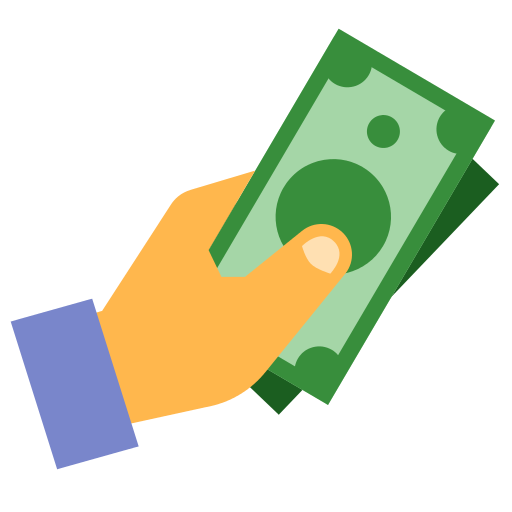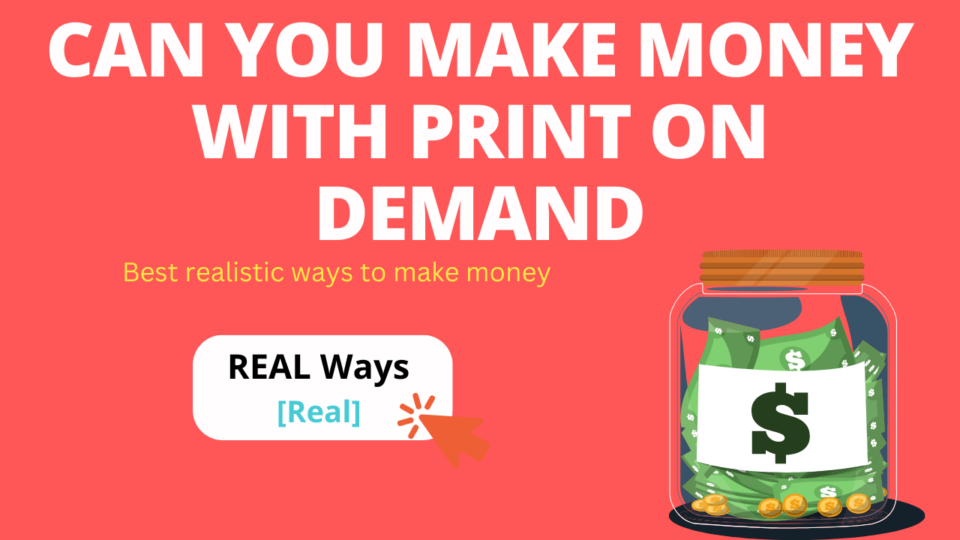Did you know you can make money with print on demand?
Whether you identify as an artist, writer, designer, or entrepreneur, tangible goods provide an excellent opportunity to transform your creative abilities into financial gains.
From customized t-shirts to artistic posters, stylish backpacks to captivating books, you have the freedom to infuse your unique touch into ordinary products and market them effectively on the internet. Nevertheless, if you opt for the conventional approach of purchasing and stockpiling inventory, you might end up with a surplus of unsold items.

Want to Make Extra Money Now?
The print-on-demand (POD) sector is projected to experience a steady growth rate of 26.1% annually until 2030.

Print-on-demand services provide a convenient alternative to the challenges of inventory management, saving you time, investment, and mitigating risks. With these services, you can effortlessly create personalized products at a significantly lower cost compared to manufacturing them independently.
This guide aims to provide you with a comprehensive introduction to the print-on-demand industry, offering valuable advice on initiating your print-on-demand business and effectively selling customized merchandise.
What exactly is print on demand (POD), and how does it operate?

A print on demand venture entails collaborating with a provider of private-label goods (such as caps or canvas bags) to personalize these items and market them under your own brand, featuring your own designs, on a per-order basis.
The beauty of print on demand lies in the fact that you don’t incur any product costs until you’ve successfully made a sale. Therefore, there’s no requirement to purchase large quantities or maintain inventory. Consequently, it has emerged as a popular ecommerce business model.
Furthermore, when you engage print-on-demand services, your supplier handles all post-sale operations, including digital printing, order fulfillment, and shipping.
An additional significant advantage of print on demand is that once you’ve set up everything, fulfilling an order after making a sale becomes a seamless process with just a few simple clicks.
You have the option to utilize print-on-demand services to:
- Validate a business idea or introduce a new product line to an existing venture, all while avoiding the risks associated with purchasing inventory. It’s also an excellent opportunity for a lucrative side hustle.
- Monetize your established audience (particularly beneficial for YouTubers or cartoonists) by allowing you to focus on creating content rather than managing order fulfillment.
- Craft original merchandise tailored to a specific customer niche, catering to individuals who possess an intense passion for activities like long-distance running, for example.
- Print individual or small batches of print-on-demand t-shirts, books, shoes, bags, wall art, phone cases, clocks, laptop skins, mugs, and various other merchandise items.
- Experiment with advertising creativity: Since print on demand eliminates the upfront cost of goods, you can run advertisements to gauge the reception of different designs and items. If you receive a significant number of orders, you can further invest in successful designs and increase your advertising expenditure.
The advantages and disadvantages of print on demand for your online retail business
Print on demand offers the opportunity to establish a business using the dropshipping approach, wherein a third party manages the product inventory and shipping logistics. It is widely regarded as one of the most convenient methods for procuring products and launching an online venture. However, it is crucial to familiarize yourself with the benefits and constraints associated with this model before fully committing.
Related: How to make money with dropshipping
Pros
- Swift product creation: Once you have the design ready, you can swiftly generate the product and make it available for sale within minutes.
- Hassle-free shipping: The responsibility of shipping and order fulfillment is entrusted to your supplier. After the sale, your primary focus shifts to customer service.
- Low investment, reduced risk: As you are not required to physically hold inventory, it becomes easier to introduce or remove products, experiment with ideas, or adapt your business strategy.
Want Quick Money?
- Discover the opportunity to earn income by answering surveys with Rakuten Insights, a renowned financial brand in America. Begin your journey by signing up here!
- InboxDollars allows you to monetize your time by answering surveys, viewing videos, online shopping, and more. Get your hands on a free $5 here!
Cons
- Narrow profit margins: Naturally, the cost per item tends to be higher compared to bulk purchases, resulting in lower profit margins.
- Limited control over shipping: Shipping costs can become complex, especially when dealing with various print-on-demand products. Additionally, your options for creating an exceptional unboxing experience may be limited.
- Restricted product range: Your ability to customize products is contingent upon the vendor and the specific product. When selecting a print-on-demand company to collaborate with, you need to consider factors such as base costs, customization options, and available sizes.
Become Your Own Boss Today!
The ultimate guide on how to be your own boss
- In this guide, we’ll explain exactly why and how to be your own boss
- Best careers to be your own boss
Generating designs without professional design skills
Designs play a pivotal role in the success of print-on-demand products. However, you don’t necessarily have to be a full-fledged designer to obtain original designs. Surveys reveal that approximately 32% of shop owners outsource their design requirements for their stores.
There are multiple approaches to commissioning or creating your own designs, provided you grasp a few essential concepts that will facilitate effective collaboration with designers.
First and foremost, it’s crucial to prepare your design file appropriately. While working with designers, clearly communicate that your design is intended for printing. This implies that it should be saved at a resolution of 300 dots per inch (dpi). The dimensions of the images you upload should match the size of the printing area for the specific product.
It’s important to note that print specifications may vary depending on the printing technique employed. When uncertain, simply share the print specifications of the particular product with the designer to ensure they have a comprehensive understanding of the requirements.
For more options, check out our list of the best sites that pay you to sign up.
In most instances, the file you upload will be in PNG or PSD format. Remember, if you utilize a transparent background, the color of the t-shirt will serve as your background color.
